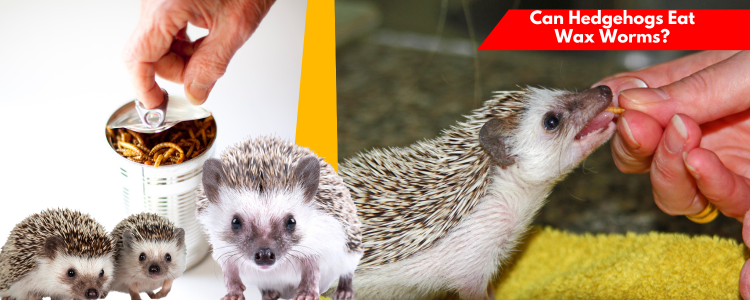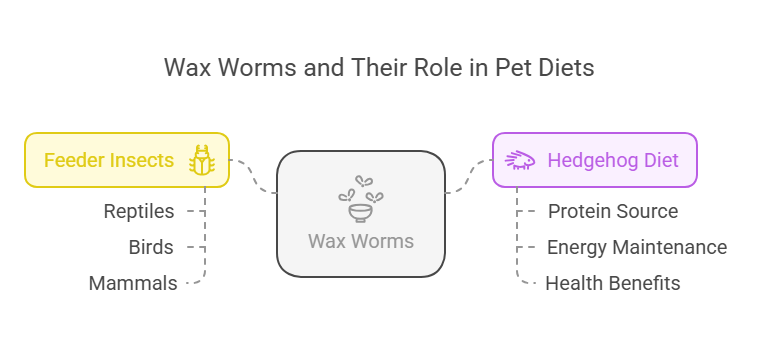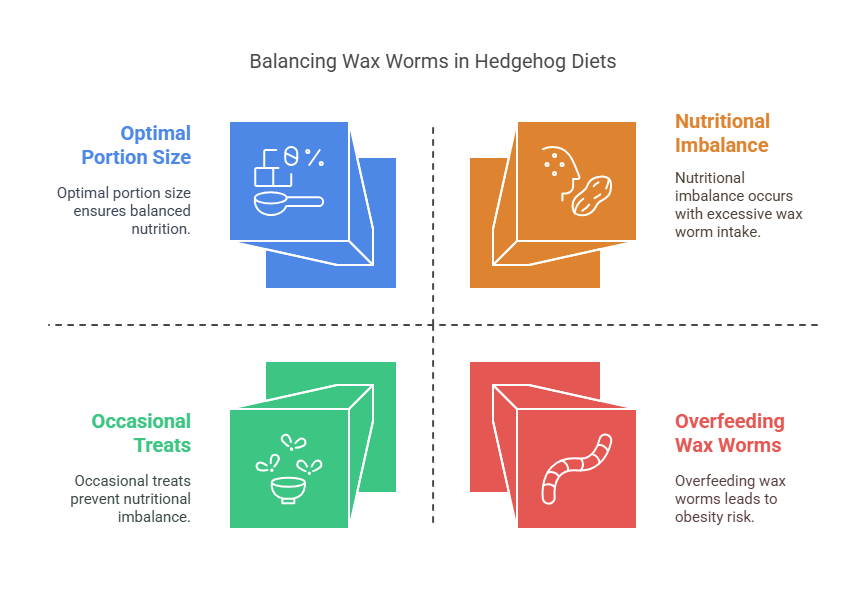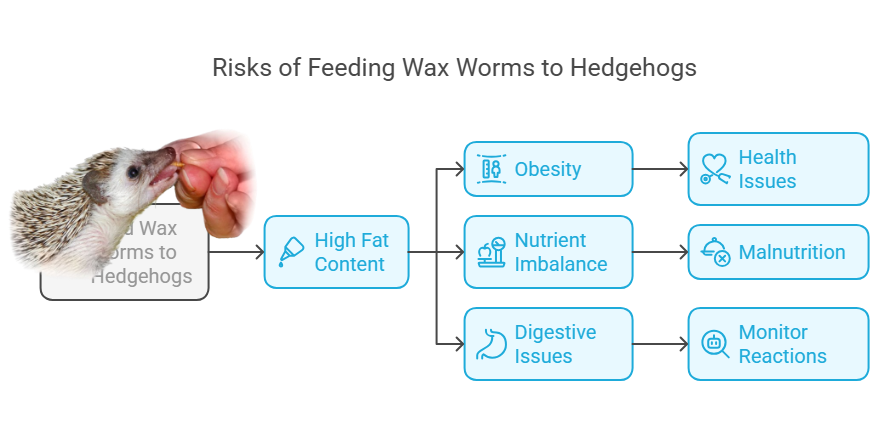Yes, Hedgehogs can enjoy wax worms as a tasty treat for these spiky creatures.
When it comes to caring for hedgehogs, one of the most frequent questions pet owners ask is whether they can feed their spiky friends certain types of food, like wax worms. Understanding the right diet for hedgehogs is essential for their health and longevity. In this blog post, we’ll explore the relationship between hedgehogs and wax worms, including whether they’re safe for hedgehogs, how often they should be fed, and the potential benefits and risks involved.
What Are Wax Worms?
Wax worms are the larvae of wax moths, specifically the Greater and Lesser Wax Moths. These larvae are commonly used as feeder insects for various reptiles, birds, and even some mammals. They are soft, white, and juicy, making them an attractive food source for many pets.
Hedgehogs, being insectivores, eat a variety of insects in the wild. This can include beetles, caterpillars, and worms. Their natural diet consists mainly of protein, and they rely on a high-protein intake to maintain their energy levels and overall health.
But how do wax worms fit into this natural diet? Are they safe for hedgehogs to eat? Let’s dive into the details.
Are Wax Worms Safe for Hedgehogs?
The short answer is yes, hedgehogs can eat wax worms. However, there are several factors to consider before adding them to your hedgehog’s diet.
1. Nutritional Content
Wax worms are high in fat, which is why they are often used as a treat or supplement for other pets. While this makes them a good source of energy, it also means they should not be a regular part of your hedgehog’s diet. A high-fat diet, if overconsumed, can lead to obesity, which is a significant health risk for hedgehogs.
Hedgehogs need a balanced diet that includes proteins, fats, and carbohydrates, with the majority of their calories coming from protein. Wax worms, due to their fat content, should only make up a small portion of their diet.
2. Frequency of Feeding
You should feed wax worms to your hedgehog sparingly. Offering them as an occasional treat, maybe once a week, is a good guideline. Feeding too many wax worms can lead to an imbalanced diet, and your hedgehog may not get the proper nutrition they need.
A varied diet is essential to ensure your hedgehog gets the right mix of vitamins and minerals. Offering a range of insects, such as mealworms, crickets, and beetles, can help provide the necessary nutrients.
3. Portion Size
It’s also important to consider portion sizes. Wax worms are quite small, so a few can go a long way. Offering too many can lead to excessive fat intake. Always keep an eye on your hedgehog’s weight and general health to ensure they’re getting a well-balanced diet.
Why Do Hedgehogs Like Wax Worms?
Hedgehogs have a keen sense of smell and taste, and wax worms have a sweet, aromatic scent that many hedgehogs find irresistible. The high-fat content and soft texture make them a tasty snack for these little creatures. For hedgehogs, who typically enjoy eating soft, protein-rich insects in the wild, wax worms are a treat they can’t resist.
However, while they may enjoy them, it’s important to remember that wax worms should not be a primary food source. Too many treats can spoil their appetite for healthier, more nutritious foods.
Risks of Feeding Wax Worms to Hedgehogs
While wax worms are not toxic to hedgehogs, there are some risks involved with feeding them too often:
1. Obesity
As mentioned, wax worms are high in fat. Overfeeding can lead to weight gain and obesity, which can cause health issues like heart disease, diabetes, and other complications. Obesity can also decrease a hedgehog’s lifespan.
2. Nutrient Imbalance
Hedgehogs need a balanced diet with a mix of proteins, fats, and carbohydrates. Too much wax worm consumption can create a nutrient imbalance, leading to malnutrition over time. It’s important to ensure they are eating a variety of foods to get all the nutrients they need.
3. Digestive Issues
Feeding wax worms in large quantities or too often can cause digestive upset, including diarrhea or constipation. It’s essential to monitor your hedgehog’s reaction after feeding wax worms to ensure they’re digesting them well.
How to Feed Wax Worms to Hedgehogs
If you choose to feed your hedgehog wax worms, here are some tips on how to do so safely:
- Moderation is Key: Only offer wax worms occasionally as a treat. A few wax worms once a week is plenty for most hedgehogs.
- Avoid Dried Wax Worms: Dried wax worms have lower nutritional value than live ones. Always opt for live wax worms to ensure the best quality and nutrition.
- Variety is Crucial: Don’t rely on wax worms as the sole source of food. Offer other insects, such as mealworms, crickets, and small amounts of cooked meat, to ensure a balanced diet.
Alternatives to Wax Worms for Hedgehogs
If you’re looking for alternative food options for your hedgehog, here are some safe and nutritious choices:
- Mealworms: These are a good source of protein and fat, though they should also be fed sparingly.
- Crickets: Crickets are an excellent source of protein and can be offered regularly.
- Beetles: Beetles are another great option for providing protein and variety in your hedgehog’s diet.
- Cooked Chicken: Offering small pieces of cooked chicken (without seasoning) can be a great protein-rich food.
- Cat Food: High-quality cat food can also be a good supplement to your hedgehog’s diet, especially if it’s rich in animal proteins.
Can Hedgehogs Eat Other Types of Worms?
Hedgehogs can safely eat several other types of worms, such as earthworms and mealworms. These worms provide a good source of protein and other essential nutrients. However, just like with wax worms, they should be fed in moderation to prevent nutritional imbalances.
Signs of a Healthy Hedgehog Diet
A healthy hedgehog should have a shiny coat, be active, and maintain a healthy weight. If you notice any of the following signs, it may indicate that your hedgehog’s diet is off balance:
- Excessive weight gain or loss
- Lethargy or lack of energy
- Skin problems or dull fur
- Diarrhea or constipation
If you notice any of these symptoms, it’s important to adjust your hedgehog’s diet and consult with a veterinarian if necessary.
FAQ About Hedgehogs and Wax Worms
1. How often can I feed my hedgehog wax worms?
You should feed your hedgehog wax worms only once a week, and only as a treat. They should not be a regular part of their diet.
2. Are wax worms better than mealworms for hedgehogs?
Mealworms are a better option for hedgehogs because they offer a more balanced nutritional profile with less fat compared to wax worms. Both should still be fed in moderation.
3. Can wax worms cause obesity in hedgehogs?
Yes, wax worms are high in fat, and feeding them too frequently can lead to obesity in hedgehogs. Always feed wax worms sparingly.
4. What other insects can hedgehogs eat?
Hedgehogs can eat mealworms, crickets, beetles, and earthworms. These provide a variety of nutrients to help maintain a balanced diet.
5. Can I feed my hedgehog wax worms every day?
No, you should only feed wax worms occasionally. A diet too high in fat can cause obesity and other health problems.
Final Thoughts
Hedgehogs can eat wax worms, but they should only be offered occasionally and in moderation. While these worms can provide some nutritional benefits, their high fat content means they shouldn’t be a regular part of your hedgehog’s diet. Always ensure a balanced diet with a variety of food options to keep your hedgehog healthy and happy.
With these guidelines, you can ensure that your hedgehog enjoys a healthy and well-balanced diet. Keep an eye on their health and make adjustments as needed for optimal care.




